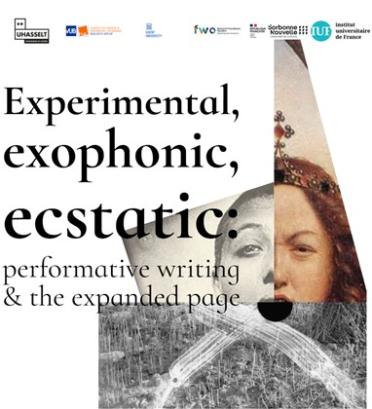CLIC is happy to announce the symposium "Experimental, Exophonic, Ecstatic: Performative Writing and the Expanded Page" which will take place on the 13th and 14th November at Usquare in Brussels.
You can now register through the conference website: https://www.projectpassage.net/eee. Registration is free for students. For non-students with institutional support, the fee is 20 EUR per day. Places are limited, so if you’re interested in attending, we encourage you to sign up sooner rather than later. If you are unable to attend after registering, please let us know so we can offer your spot to someone else.
Keynote speakers:
- Prof. dr. Peggy Phelan, Stanford, US: "More Mothering: On Art/ Writing and the Conundrum of Analysis"
- Prof. dr. Nizan Shaked, California State University Long Beach, US: “What does it mean to write a square? Adrian Piper and the (non) Representation of the Self"
To view the full programme, please click here.
Theme
Stemming from the project “Mapping performative writing and the page as an expanded field (1966- the present): experimental, exophonic and ecstatic literatures in transcultural Anglophone spheres”, this conference will focus on performative writing.
We understand this to be writing wherein the materiality of a text and the act of writing in itself are strategic, creative-critical devices that fuse form and content. Performative writing is an urgent theme given its enactment of self and/as language. This can broaden our understanding of what literature is or can be on and beyond the page. Perhaps more importantly, we find it to be uniquely capable of reflecting a rich, complex world. In her essential text “Performing Writing” (1998), Della Pollock identified one of performative writing’s core characteristics as its intersubjective ability to “bring the reader into contact with ‘other-worlds’ [...]: worlds of memory, pleasure, sensation, imagination, affect and in-sight.” (80).

Strands
Experimental: conceptual writing (from poetry to fiction) that employs conceptual strategies, typically in the second half of the 20th century. Its origins can be found in the art and literature of the late 1960s and 1970s. Strategies such as appropriation, typographical experiments, collage, insertion of multiple genres, found text, image/text juxtapositions, repetition, artistic/objectual conceptions of the book, etc. contribute to the performativity of the work on the page.
Exophonic: located outside the “monolingual paradigm”, this writing prioritises the voices (in the largest sense of the term) through which meaning is transmitted, especially when “understanding” is compromised. Outside language(s) as we are used to conceiving of them, it may even attempts to escape language itself. Devices used here are explicitly multilingual writing, self-translation and bilingual versions, accents free of relation to identifiable language.
Ecstatic: invested in citational practices, this writing uses (and acknowledges) other people’s words not only to scaffold critical discourse, but also as a creative device. This may have implications in the way we theorise and narrate the self (for example, in autotheory, see Fournier, Brostoff); and it is, inevitably, political (Ahmed). Katherine McKittrick, writing from a Black studies perspective, asks that referencing “takes us outside ourselves” (16), an unhinging of the self (16). By using citations as creative literary devices, the textual body ecstatically stands outside itself. New meaning emerges as the text is iterated and performed anew.
Invited Speakers/Performers
- Henry Andersen (KASK, Ghent, BE)
- Delphine Grass (U. Lancaster, UK)
- Sharon Kivland (Ma Bibliothèque editorial, UK + FR)
- Roy Claire Potter (Liverpool John Moores U., UK)
- Lily Robert Foley (U. Paul Valéry Montpellier 3, FR)
- Thierry Roustan (independent, FR)
Organising Committee
- Maria Gil Ulldemolins, Assistant Professor, Universiteit Hasselt
- Christopher Mole, ATER, Université Sorbonne Nouvelle
- Amanda Murphy, Maîtresse de conférences, Université Sorbonne Nouvelle
- Kris Pint, Associate Professor, Universiteit Hasselt
- Arvi Sepp, Professor, Vrije Universiteit Brussel (VUB)
- Hannah Van Hove, Postdoctoral Researcher, Vrije Universiteit Brussel (VUB)
- Tessel Veneboer, Doctoral Student, Universiteit Gent
